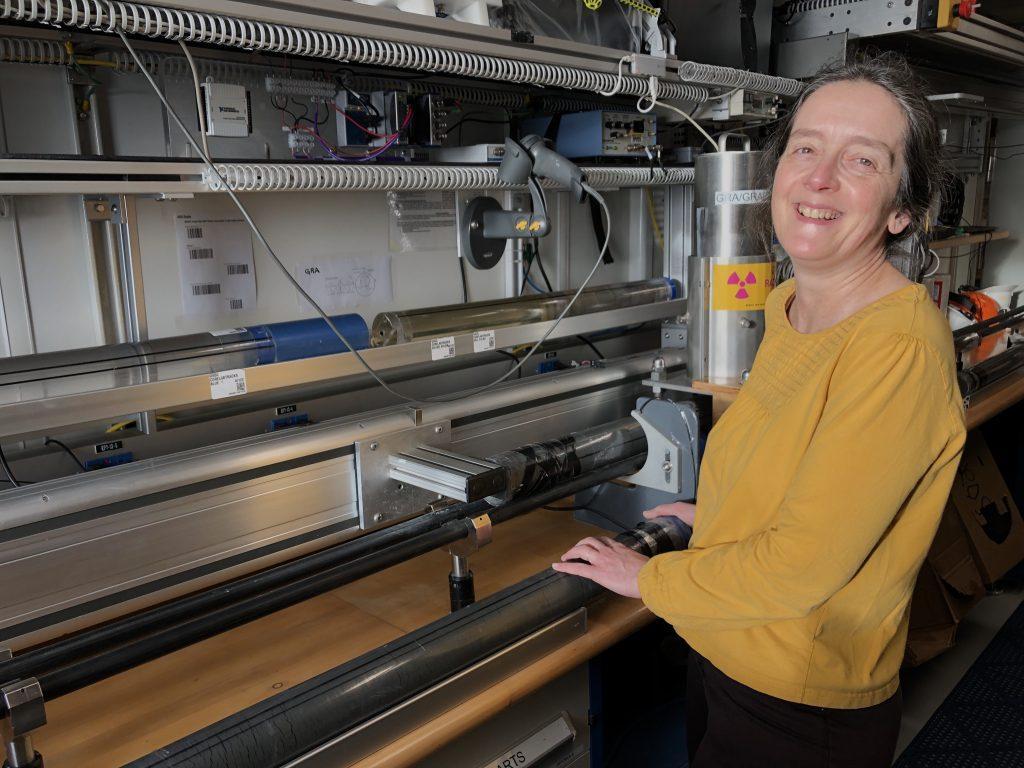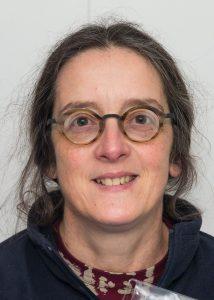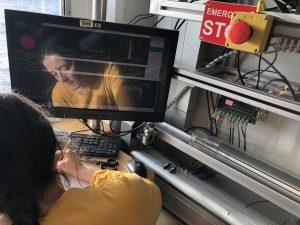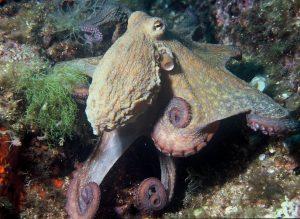
Career Profile: Physical Properties Scientist Elisabeth Michel

Elisabeth Michel Interview
Please describe your job duties while on the JR. What will you be doing on a daily basis?
-
-
-
-
-
-
-
-
- After whole-round cores come out and get cut into 1.5m sections and laser marked, I’ll start the analyses: gamma ray density, magnetic susceptibility, P-Wave velocity, natural gamma ray, thermal conductivity and do discrete sampling to calibrate the density. I’ll also participate with writing the core reports.
-
-
-
-
-
-
-
Describe one instrument or tool that is essential for you to do your job? Or a piece of equipment on the JR that is useful and why – what does it do?
-
-
-
-
-
-
-
-
- Density and magnetic susceptibility are linked to the sediment composition and they are useful to quickly correlate the different holes on a site. These measurements need to be quickly done to decide at what depth within the sediment the next core should be fired to get a full record for the site. This is achieved by splicing together the different holes. To do these analyses, there are two instruments the core is pushed through. The first measures the magnetic susceptibility (amount of sediment that can be magnetized) and the second measures the amount of gamma rays passing through the core. The denser the sediment, the smaller amount of gamma ray that will cross it.
-
-
-
-
-
-
-
- Then the observations/results from the different science party members is compared to the physical properties measurements to understand the different grains that make up the sediment.
Why is your work (or research) important? What question are you trying to answer or how does your work/research help assist/advance scientific knowledge?
- The Earth climate system is the result of complex interactions between atmosphere, ocean, ice caps and sea ice, vegetation, continents, ocean and terrestrial life and we still need to learn a lot about this complex system. Looking at past changes allow us to decipher the different mechanisms linking the different components, to improve and test our numerical climate models.

Why the ocean? What made you choose a career at sea or career that involves the ocean?
- Life brought me to the ocean more than a real choice.
What are you most excited about for this expedition and/or being on the JR?
- I’ve been on a different boat, never on the JR, so it’s a new experience and the first time on a drilling boat. IODP promotes collaborative work between participants and the people I knew were nice people and I would appreciate collaborating with them. I’m also very interested about people having other research interests and to learn about the life of the different people on board.
What are three things you think are needed for a successful expedition at sea? And Why!
- Having the 123 people enjoying the cruise, bringing back interesting cores, starting new collaborations between the cruise participants. Time at sea allows a lot of scientific discussion and sometimes more in-depth discussions about life, discovering other countries way of living, thinking…. sometimes making friends that you’ll stay in contact with.
If you could answer one question about our Earth – what would it be and why?
- I like to make experiments for children or adults to help them discover how the ocean deep circulation works and why is it important for regional climate. Then they find out how the changing ocean is an active participant in changing the climate.
- Nature has always more imagination than us and pushes us to find new ideas.
What is your favorite sea creature and why?
- Octopus: very clever, but also very good to eat unfortunately.

When did you know you wanted to pursue a career in science or an ocean science career?
- Curiosity is the main driver for a scientific career. It’s a chance to have a job where your goal is to try to understand how things are working. I always thought I would appreciate a work that allowed me to always ask and ask…. I discover quite late that Earth was a huge playground for questions.
What do you personally hope to gain or experience while on EXP383?
- Discovering new people, starting collaboration with new colleagues and following previous collaborations, learning a lot from everybody and about experiments new to me.
What message do you have for anyone considering a career at sea or a career involving the ocean sciences?
- If they really feel they would like it, just try their best to do it.
What do you do back home when not on the JR?
- Take care of the people I left for two months. Do the work at the lab that is waiting (working with students, experiments, proposals..)
Do you get seasick? If yes or sometimes, please also select the other tab and describe how you cope with it.
- Sometimes: on small boats depending on the fuel smell, the sea…… I do not think I could be seasick on the JR
The need for space comes in many forms. Which type of space, in general, is the most important to you?
- x___Personal Space
- x__Creative Space
- x___Outdoor Space
- x___Emotional Space
- ___Physical Space
- ___Spiritual or Meditative
- ___Outer Space
- x___Community Space
- x___Quite Space
- x___Productive/Work Space
- ___Digital/Virtual Space
- ___Public Space
- ___Inner Space
- x__Other: music space
Why that type of space? What makes it important to you and will it be available while on the JR?
- I cannot make a choice, I need all of them…… What I’ll miss mainly on the JR will be outdoor and music space (making music with others but we might do some) and for sure my friends and family!